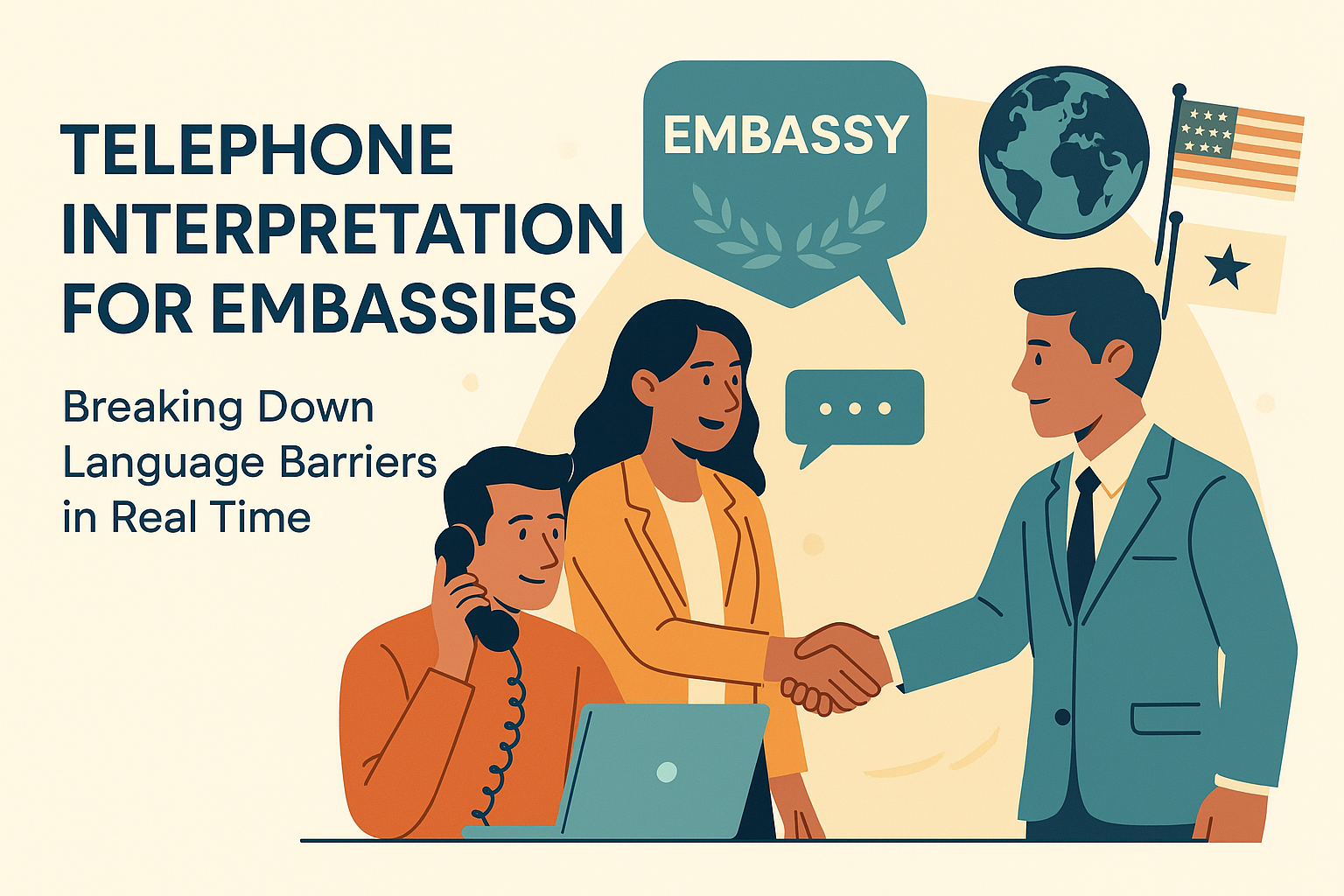
The Crucial Role of Telephone Interpretation for Embassies
In the high-stakes world of diplomacy, clarity isn’t optional—it’s everything. Embassies and consulates operate on the front lines of international communication, serving citizens abroad and facilitating critical exchanges with foreign governments, businesses, and individuals. One of the most underappreciated yet essential tools in this environment is telephone interpretation. This service ensures that conversations transcend language barriers while preserving accuracy, discretion, and speed.
Breaking Down Language Barriers in Real Time
Language differences can quickly turn a routine inquiry into a diplomatic roadblock. That’s where telephone interpretation shines. It provides instant access to trained interpreters who can bridge the gap between embassy personnel and non-native speakers—often within seconds.
For citizens visiting an embassy in a country where they don’t speak the language fluently, communicating legal, medical, or immigration concerns can feel overwhelming. Telephone interpreters enable natural, two-way conversations that ensure no one is misunderstood, regardless of accent, dialect, or complexity of the subject matter.
Why Accuracy and Confidentiality Matter
Conversations held within embassies and consulates often involve legal, immigration, or emergency topics—areas where accuracy isn’t negotiable. A single misinterpreted phrase could delay a visa application, misrepresent a legal position, or spark diplomatic confusion.
Professional telephone interpreters are trained to maintain strict confidentiality and neutrality. They know how to handle sensitive or classified information without compromising privacy. This is especially critical when dealing with asylum cases, legal proceedings, or health-related emergencies.
Instant Support When Timing Is Everything
Emergencies don’t wait for business hours. Whether it’s a political crisis unfolding at midnight or a family trying to reach their embassy during a natural disaster, telephone interpretation for embassies offers 24/7 access to language support. This responsiveness can be the difference between timely assistance and costly delays.
Unlike on-site interpreting, phone interpretation doesn’t require travel or scheduling logistics. Within moments, embassies can be connected to a qualified interpreter in over 300 languages—no matter the time zone.
Expanding Access to Remote Citizens
Many people living in rural or remote areas don’t have easy access to embassy services. Telephone interpretation breaks down that barrier by allowing consular staff to support citizens across wide geographies without requiring travel. Whether someone is hours away from the nearest consulate or stranded in a conflict zone, language shouldn’t be the reason they can’t get help.
This scalable model enables embassies to extend their reach and serve more people—efficiently, equitably, and cost-effectively.
Cultural Intelligence and Protocol Sensitivity
Embassy interactions aren’t just about language; they’re about context. A well-trained telephone interpreter isn’t just fluent—they’re culturally competent. They understand diplomatic etiquette, local norms, and the subtle nuances that can make or break an international conversation.
From using honorifics correctly to avoiding cultural taboos, interpreters play a key role in ensuring that communication isn’t just accurate—it’s also respectful.
Supporting Education and Consular Navigation
Interpreters don’t just pass along words—they often guide citizens through complex consular procedures. From helping someone understand their rights during deportation proceedings to explaining the process for renewing a passport abroad, telephone interpreters serve as critical liaisons. They make bureaucratic systems accessible to people who may otherwise feel excluded.
This guidance builds trust, helps prevent errors in documentation, and ensures that every individual gets the support they need.
A Lifeline in Crises and Emergencies
When disaster strikes—whether it’s a political uprising, a health emergency, or a natural catastrophe—embassies often become lifelines. In these high-pressure situations, clear communication saves lives. Through telephone interpretation, embassies can coordinate evacuations, issue safety instructions, or connect families with critical information in their native language.
It’s not just a helpful service—it’s a lifeline.
Conclusion: Interpretation as a Strategic Advantage
In today’s interconnected world, telephone interpretation for embassies is no longer just a convenience—it’s a strategic necessity. It reinforces a commitment to accessibility, inclusion, and human rights. It streamlines communication, protects the dignity of all parties, and ensures that embassies can operate with efficiency, speed, and cultural sensitivity.
At TransOptimum, we believe in empowering embassies to serve their citizens without language getting in the way. That’s why our interpreters are available 24/7 and trained to handle even the most sensitive situations with professionalism and care.
Need support for your embassy or consulate? Get in touch with our team and learn how we can help.